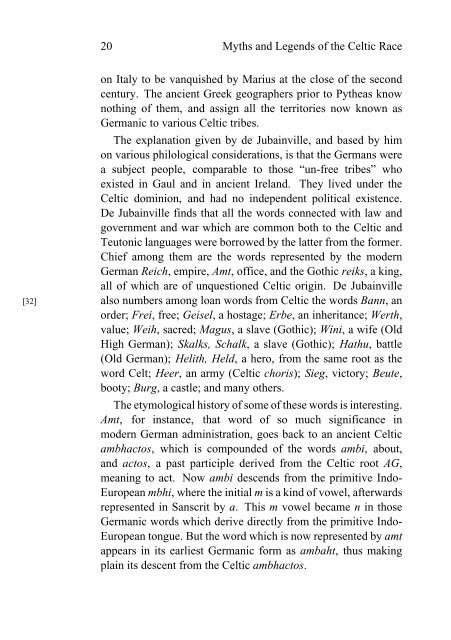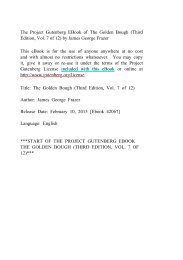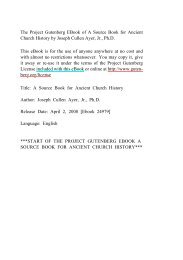- Page 1 and 2: The Project Gutenberg EBook of Myth
- Page 3 and 4: T. W. ROLLESTON MYTHS & LEGENDS OF
- Page 5 and 6: [9] PREFACE The Past may be forgott
- Page 7: PREFACE 3 Warwickshire, Leicestersh
- Page 11 and 12: Illustrations Queen Maev . . . . .
- Page 13 and 14: CHAPTER I: THE CELTS IN ANCIENT HIS
- Page 15 and 16: CHAPTER I: THE CELTS IN ANCIENT HIS
- Page 17 and 18: CHAPTER I: THE CELTS IN ANCIENT HIS
- Page 19 and 20: CHAPTER I: THE CELTS IN ANCIENT HIS
- Page 21 and 22: CHAPTER I: THE CELTS IN ANCIENT HIS
- Page 23: CHAPTER I: THE CELTS IN ANCIENT HIS
- Page 27 and 28: CHAPTER I: THE CELTS IN ANCIENT HIS
- Page 29 and 30: CHAPTER I: THE CELTS IN ANCIENT HIS
- Page 31 and 32: CHAPTER I: THE CELTS IN ANCIENT HIS
- Page 33 and 34: CHAPTER I: THE CELTS IN ANCIENT HIS
- Page 35 and 36: CHAPTER I: THE CELTS IN ANCIENT HIS
- Page 37 and 38: CHAPTER I: THE CELTS IN ANCIENT HIS
- Page 39 and 40: CHAPTER I: THE CELTS IN ANCIENT HIS
- Page 41 and 42: CHAPTER II: THE RELIGION OF THE CEL
- Page 43 and 44: CHAPTER II: THE RELIGION OF THE CEL
- Page 45 and 46: CHAPTER II: THE RELIGION OF THE CEL
- Page 47 and 48: CHAPTER II: THE RELIGION OF THE CEL
- Page 49 and 50: CHAPTER II: THE RELIGION OF THE CEL
- Page 51 and 52: CHAPTER II: THE RELIGION OF THE CEL
- Page 53 and 54: CHAPTER II: THE RELIGION OF THE CEL
- Page 55 and 56: CHAPTER II: THE RELIGION OF THE CEL
- Page 57 and 58: CHAPTER II: THE RELIGION OF THE CEL
- Page 59 and 60: CHAPTER II: THE RELIGION OF THE CEL
- Page 61 and 62: CHAPTER II: THE RELIGION OF THE CEL
- Page 63 and 64: CHAPTER II: THE RELIGION OF THE CEL
- Page 65 and 66: CHAPTER II: THE RELIGION OF THE CEL
- Page 67 and 68: CHAPTER II: THE RELIGION OF THE CEL
- Page 69 and 70: CHAPTER II: THE RELIGION OF THE CEL
- Page 71 and 72: CHAPTER II: THE RELIGION OF THE CEL
- Page 73 and 74: CHAPTER II: THE RELIGION OF THE CEL
- Page 75 and 76:
CHAPTER II: THE RELIGION OF THE CEL
- Page 77 and 78:
CHAPTER II: THE RELIGION OF THE CEL
- Page 79 and 80:
CHAPTER III: THE IRISH INVASION MYT
- Page 81 and 82:
CHAPTER III: THE IRISH INVASION MYT
- Page 83 and 84:
CHAPTER III: THE IRISH INVASION MYT
- Page 85 and 86:
CHAPTER III: THE IRISH INVASION MYT
- Page 87 and 88:
CHAPTER III: THE IRISH INVASION MYT
- Page 89 and 90:
CHAPTER III: THE IRISH INVASION MYT
- Page 91 and 92:
CHAPTER III: THE IRISH INVASION MYT
- Page 93 and 94:
CHAPTER III: THE IRISH INVASION MYT
- Page 95 and 96:
CHAPTER III: THE IRISH INVASION MYT
- Page 97 and 98:
CHAPTER III: THE IRISH INVASION MYT
- Page 99 and 100:
CHAPTER III: THE IRISH INVASION MYT
- Page 101 and 102:
CHAPTER III: THE IRISH INVASION MYT
- Page 103 and 104:
CHAPTER III: THE IRISH INVASION MYT
- Page 105 and 106:
CHAPTER III: THE IRISH INVASION MYT
- Page 107 and 108:
CHAPTER III: THE IRISH INVASION MYT
- Page 109 and 110:
CHAPTER III: THE IRISH INVASION MYT
- Page 111 and 112:
CHAPTER III: THE IRISH INVASION MYT
- Page 113 and 114:
CHAPTER III: THE IRISH INVASION MYT
- Page 115 and 116:
CHAPTER III: THE IRISH INVASION MYT
- Page 117 and 118:
CHAPTER III: THE IRISH INVASION MYT
- Page 119 and 120:
CHAPTER III: THE IRISH INVASION MYT
- Page 121 and 122:
CHAPTER III: THE IRISH INVASION MYT
- Page 123 and 124:
CHAPTER III: THE IRISH INVASION MYT
- Page 125 and 126:
CHAPTER IV: THE EARLY MILESIAN KING
- Page 127 and 128:
CHAPTER IV: THE EARLY MILESIAN KING
- Page 129 and 130:
CHAPTER IV: THE EARLY MILESIAN KING
- Page 131 and 132:
CHAPTER IV: THE EARLY MILESIAN KING
- Page 133 and 134:
CHAPTER IV: THE EARLY MILESIAN KING
- Page 135 and 136:
CHAPTER IV: THE EARLY MILESIAN KING
- Page 137 and 138:
CHAPTER IV: THE EARLY MILESIAN KING
- Page 139 and 140:
CHAPTER IV: THE EARLY MILESIAN KING
- Page 141 and 142:
CHAPTER IV: THE EARLY MILESIAN KING
- Page 143 and 144:
CHAPTER IV: THE EARLY MILESIAN KING
- Page 145 and 146:
CHAPTER IV: THE EARLY MILESIAN KING
- Page 147 and 148:
CHAPTER IV: THE EARLY MILESIAN KING
- Page 149 and 150:
CHAPTER IV: THE EARLY MILESIAN KING
- Page 151 and 152:
CHAPTER IV: THE EARLY MILESIAN KING
- Page 153 and 154:
CHAPTER V: TALES OF THE ULTONIAN CY
- Page 155 and 156:
CHAPTER V: TALES OF THE ULTONIAN CY
- Page 157 and 158:
CHAPTER V: TALES OF THE ULTONIAN CY
- Page 159 and 160:
CHAPTER V: TALES OF THE ULTONIAN CY
- Page 161 and 162:
CHAPTER V: TALES OF THE ULTONIAN CY
- Page 163 and 164:
CHAPTER V: TALES OF THE ULTONIAN CY
- Page 165 and 166:
CHAPTER V: TALES OF THE ULTONIAN CY
- Page 167 and 168:
CHAPTER V: TALES OF THE ULTONIAN CY
- Page 169 and 170:
CHAPTER V: TALES OF THE ULTONIAN CY
- Page 171 and 172:
CHAPTER V: TALES OF THE ULTONIAN CY
- Page 173 and 174:
CHAPTER V: TALES OF THE ULTONIAN CY
- Page 175 and 176:
CHAPTER V: TALES OF THE ULTONIAN CY
- Page 177 and 178:
CHAPTER V: TALES OF THE ULTONIAN CY
- Page 179 and 180:
CHAPTER V: TALES OF THE ULTONIAN CY
- Page 181 and 182:
CHAPTER V: TALES OF THE ULTONIAN CY
- Page 183 and 184:
CHAPTER V: TALES OF THE ULTONIAN CY
- Page 185 and 186:
CHAPTER V: TALES OF THE ULTONIAN CY
- Page 187 and 188:
CHAPTER V: TALES OF THE ULTONIAN CY
- Page 189 and 190:
CHAPTER V: TALES OF THE ULTONIAN CY
- Page 191 and 192:
CHAPTER V: TALES OF THE ULTONIAN CY
- Page 193 and 194:
CHAPTER V: TALES OF THE ULTONIAN CY
- Page 195 and 196:
CHAPTER V: TALES OF THE ULTONIAN CY
- Page 197 and 198:
CHAPTER V: TALES OF THE ULTONIAN CY
- Page 199 and 200:
CHAPTER V: TALES OF THE ULTONIAN CY
- Page 201 and 202:
CHAPTER V: TALES OF THE ULTONIAN CY
- Page 203 and 204:
CHAPTER V: TALES OF THE ULTONIAN CY
- Page 205 and 206:
CHAPTER V: TALES OF THE ULTONIAN CY
- Page 207 and 208:
CHAPTER V: TALES OF THE ULTONIAN CY
- Page 209 and 210:
CHAPTER V: TALES OF THE ULTONIAN CY
- Page 211 and 212:
CHAPTER V: TALES OF THE ULTONIAN CY
- Page 213 and 214:
CHAPTER V: TALES OF THE ULTONIAN CY
- Page 215 and 216:
CHAPTER V: TALES OF THE ULTONIAN CY
- Page 217 and 218:
CHAPTER V: TALES OF THE ULTONIAN CY
- Page 219 and 220:
CHAPTER VI: TALES OF THE OSSIANIC C
- Page 221 and 222:
CHAPTER VI: TALES OF THE OSSIANIC C
- Page 223 and 224:
CHAPTER VI: TALES OF THE OSSIANIC C
- Page 225 and 226:
CHAPTER VI: TALES OF THE OSSIANIC C
- Page 227 and 228:
CHAPTER VI: TALES OF THE OSSIANIC C
- Page 229 and 230:
CHAPTER VI: TALES OF THE OSSIANIC C
- Page 231 and 232:
CHAPTER VI: TALES OF THE OSSIANIC C
- Page 233 and 234:
CHAPTER VI: TALES OF THE OSSIANIC C
- Page 235 and 236:
CHAPTER VI: TALES OF THE OSSIANIC C
- Page 237 and 238:
CHAPTER VI: TALES OF THE OSSIANIC C
- Page 239 and 240:
CHAPTER VI: TALES OF THE OSSIANIC C
- Page 241 and 242:
CHAPTER VI: TALES OF THE OSSIANIC C
- Page 243 and 244:
CHAPTER VI: TALES OF THE OSSIANIC C
- Page 245 and 246:
CHAPTER VI: TALES OF THE OSSIANIC C
- Page 247 and 248:
CHAPTER VI: TALES OF THE OSSIANIC C
- Page 249 and 250:
CHAPTER VI: TALES OF THE OSSIANIC C
- Page 251 and 252:
CHAPTER VI: TALES OF THE OSSIANIC C
- Page 253 and 254:
CHAPTER VI: TALES OF THE OSSIANIC C
- Page 255 and 256:
CHAPTER VI: TALES OF THE OSSIANIC C
- Page 257 and 258:
CHAPTER VI: TALES OF THE OSSIANIC C
- Page 259 and 260:
CHAPTER VI: TALES OF THE OSSIANIC C
- Page 261 and 262:
CHAPTER VI: TALES OF THE OSSIANIC C
- Page 263 and 264:
CHAPTER VI: TALES OF THE OSSIANIC C
- Page 265 and 266:
CHAPTER VI: TALES OF THE OSSIANIC C
- Page 267 and 268:
CHAPTER VI: TALES OF THE OSSIANIC C
- Page 269 and 270:
CHAPTER VII: THE VOYAGE OF MAELDUN
- Page 271 and 272:
CHAPTER VII: THE VOYAGE OF MAELDUN
- Page 273 and 274:
CHAPTER VII: THE VOYAGE OF MAELDUN
- Page 275 and 276:
CHAPTER VII: THE VOYAGE OF MAELDUN
- Page 277 and 278:
CHAPTER VII: THE VOYAGE OF MAELDUN
- Page 279 and 280:
CHAPTER VII: THE VOYAGE OF MAELDUN
- Page 281 and 282:
CHAPTER VII: THE VOYAGE OF MAELDUN
- Page 283 and 284:
CHAPTER VII: THE VOYAGE OF MAELDUN
- Page 285 and 286:
CHAPTER VII: THE VOYAGE OF MAELDUN
- Page 287 and 288:
CHAPTER VII: THE VOYAGE OF MAELDUN
- Page 289 and 290:
285 CHAPTER VIII: MYTHS AND TALES O
- Page 291 and 292:
287 graphically not by a bounding l
- Page 293 and 294:
289 Nennius The earliest extant men
- Page 295 and 296:
291 wonderful success. It was speed
- Page 297 and 298:
293 doubt they were largely Breton.
- Page 299 and 300:
295 Conqueror into England. 212 The
- Page 301 and 302:
297 which has since been considered
- Page 303 and 304:
299 +----------------+------+--+---
- Page 305 and 306:
301 Anlawdd + +--------------------
- Page 307 and 308:
303 the original community of Gaeli
- Page 309 and 310:
305 “I come from battle and confl
- Page 311 and 312:
307 Sun-god into the western sea, a
- Page 313 and 314:
309 in an unforeseen difficulty. Th
- Page 315 and 316:
311 like gold, and sitting on a pur
- Page 317 and 318:
313 the knights he had with him, wh
- Page 319 and 320:
315 it was as big and strong as a c
- Page 321 and 322:
317 giant form of Bran. They carous
- Page 323 and 324:
319 might not come to the ears of B
- Page 325 and 326:
321 in the White Mount 235 looking
- Page 327 and 328:
323 be weary. “Let us go into Llo
- Page 329 and 330:
325 beneath his dignity to take ven
- Page 331 and 332:
327 rules over the one-and-twenty c
- Page 333 and 334:
329 river Conway is still called th
- Page 335 and 336:
331 special circumstances, and Blod
- Page 337 and 338:
333 The Story of Lludd and Llevelys
- Page 339 and 340:
335 of Lludd of the Silver Hand—s
- Page 341 and 342:
337 after them a poisoned dart. Bed
- Page 343 and 344:
339 and camp of Arthur—here the q
- Page 345 and 346:
341 Here let us pause for a moment
- Page 347 and 348:
343 And first Kai was overthrown, a
- Page 349 and 350:
345 him sleeping, and doubted her f
- Page 351 and 352:
347 with one of his sharp stakes an
- Page 353 and 354:
349 lord, had been lamed. Peredur h
- Page 355 and 356:
351 that the Graal was the Cup of t
- Page 357 and 358:
353 promoting increase, wealth, and
- Page 359 and 360:
355 More remotely still the cauldro
- Page 361 and 362:
357 cauldron, and a blind man named
- Page 363 and 364:
359 days past, but my wife has neve
- Page 365 and 366:
361 main current of the development
- Page 367 and 368:
363 To render these names accuratel
- Page 369 and 370:
365 AILBACH (el-yach) Fortress in C
- Page 371 and 372:
367 AMYN´TAS II. King of Macedon,
- Page 373 and 374:
369 ARI´ANROD. Sister of Gwydion;
- Page 375 and 376:
371 AVON DIA. Duel between Cuchulai
- Page 377 and 378:
373 BEN´DIGEID VRAN, or “BRAN TH
- Page 379 and 380:
375 BŌV THE RED. King of the Danaa
- Page 381 and 382:
377 BRIGINDO. Equivalents, Brigit a
- Page 383 and 384:
379 BURY, PROFESSOR. Remarks of, re
- Page 385 and 386:
381 CAULDRON OF ABUNDANCE. See equi
- Page 387 and 388:
383 ranges of the Balkans and Carpa
- Page 389 and 390:
385 CHRY´SOSTOM, DION. Testimony o
- Page 391 and 392:
387 CONANN. Fomorian king, 101 CON
- Page 393 and 394:
389 his death caused by Conall's
- Page 395 and 396:
391 CUCHULAIN (CUCHULLIN) (coo-hoo
- Page 397 and 398:
393 CUMHAL (coo´al). Chief of the
- Page 399 and 400:
395 DALNY. Queen of Partholan, 96 D
- Page 401 and 402:
397 DECIES. Son of King of the, woo
- Page 403 and 404:
399 DIN´ODIG. Cantrev of, over whi
- Page 405 and 406:
401 EBER DONN (Brown Eber). Milesia
- Page 407 and 408:
403 ERINN (ERIN). See Eriu, 132; re
- Page 409 and 410:
405 EXCALIBUR. See Caliburn, 338, a
- Page 411 and 412:
407 FER´AMORC. The kingdom of, ove
- Page 413 and 414:
409 FIANNA (fee´anna) OF ERIN, THE
- Page 415 and 416:
411 Grania and, 296-304; bewails Os
- Page 417 and 418:
413 GAE BOLG. The thrust of, taught
- Page 419 and 420:
415 GERM (ghermawn—g hard). Diura
- Page 421 and 422:
417 GOWRA (GABHRA). References to O
- Page 423 and 424:
419 GWION BACH. Son of Gwreang; put
- Page 425 and 426:
421 HEININ. Bard at Arthur's court,
- Page 427 and 428:
423 INDIA. Dolmens found in, 53; sy
- Page 429 and 430:
425 IRON AGE. The ship a well-recog
- Page 431 and 432:
427 JOHN, MR. IVOR B. His opinion o
- Page 433 and 434:
429 KIAN. Father of Lugh, 109; brot
- Page 435 and 436:
431 LAND OF THE DEAD. “Spain” a
- Page 437 and 438:
433 LISMORE. “The Dean of Lismore
- Page 439 and 440:
435 LUGH (loo), or LUGUS. 1. See Ap
- Page 441 and 442:
437 MACHA. Daughter of Red Hugh, 15
- Page 443 and 444:
439 MALORY. Anticipated by Wace, 33
- Page 445 and 446:
441 MATIÈRE DE FRANCE. Source of R
- Page 447 and 448:
443 MILED. 1. Sons of; conquer the
- Page 449 and 450:
445 MOYTURA, PLAIN OF. 1. Scene of
- Page 451 and 452:
447 NECHTAN. Dūn of the sons of, 1
- Page 453 and 454:
449 NUTT, MR. ALFRED. Reference to,
- Page 455 and 456:
451 OSSIANIC SOCIETY. “Transactio
- Page 457 and 458:
453 PLINY. Religion of magic discus
- Page 459 and 460:
455 RATH GRANIA. King Cormac and Fi
- Page 461 and 462:
457 SABA. Wife of Finn, mother of O
- Page 463 and 464:
459 SKATHA. A mighty woman-warrior
- Page 465 and 466:
461 STRABO. Characteristics of Celt
- Page 467 and 468:
463 TELLTOWN (TELTIN). Palace at, o
- Page 469 and 470:
465 TUATHA DE DANANN (thoo'a-haw da
- Page 471 and 472:
467 VALLEY OF THE THRUSHES. Oisīn'
- Page 473:
***END OF THE PROJECT GUTENBERG EBO
- Page 477 and 478:
A Word from Project Gutenberg This
- Page 479 and 480:
The Full Project Gutenberg License
- Page 481 and 482:
The Full Project Gutenberg License
- Page 483 and 484:
The Full Project Gutenberg License
- Page 485 and 486:
The Full Project Gutenberg License
- Page 487 and 488:
The Full Project Gutenberg License
- Page 489 and 490:
The Full Project Gutenberg License
















